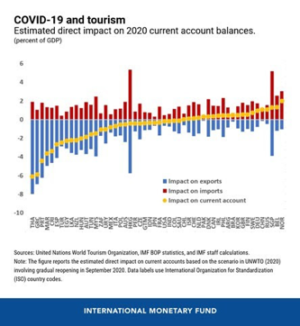
Pandemic-related lockdowns, flight cancellations, and border closures may be putting a crimp on summer vacation plans. However, the precipitous drop in tourism will have an outsized impact on countries that rely on foreign travelers—with potentially large-scale effects on their economies’ national accounts.
Costa Rica, Greece, Morocco, Portugal, and Thailand could be among the hardest hit with losses in tourism proceeds exceeding 3 percent of GDP, according to the IMF’s recently released 2020 External Sector Report.
The chart calculates direct tourism impacts on imports, exports and current account balances under a scenario that envisions gradual reopenings in September but a drop of about 70 percent in tourism receipts and international tourism arrivals in 2020.
A country’s current account balance is a measure of its total transactions—which includes but is not limited to trade in goods and services—with the rest of the world. For some economies, a drop in tourism (which is considered an export) could have an impact on overall current account balances.

For example, in Thailand, a decrease in tourism due to COVID-19 could bring the country’s overall exports down by 8 percentage points of GDP and have a direct net impact of about 6 percentage points of GDP on its current account balance in 2020. That could erode part of the 7 percent overall current account surplus the country had in 2019.
The outlook for smaller, tourism-dependent nations is even more stark. This chart and the External Sector Report’s focus on medium to large economies, but, under the same scenario, some smaller states especially reliant on tourism could see a dramatically larger direct impact on their trade and current account balances.
Still, the overall effect a decline in tourism will have on current account balances may be less than these projected direct impacts foretell. Smaller, tourism dependent countries and even larger economies with a large tourism industry may see offsetting indirect effects. For example, smaller nations with less domestic resources often rely on more imports to support their tourism industries. A drop in tourism exports and the economic activity that it drives, both directly and indirectly, will lead to a corresponding drop in imports—lessening the overall impact on the current account balance.
Much is still unknown about the pace of tourism recovery in 2020. Peoples’ desire and ability to travel abroad may continue to face headwinds going into 2021 due to the ongoing pandemic, leaving an uncertain outlook for tourism industries in economies both big and small.









